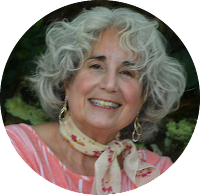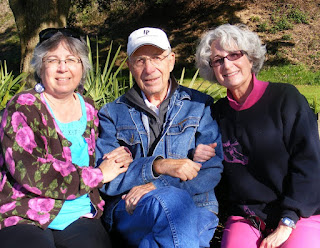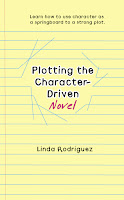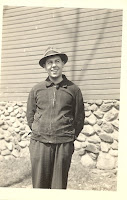by
Linda Rodriguez
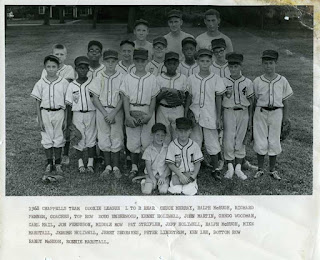 |
| My stepfather coaches my little brother’s team |
When
I look back on my life, I realize I’ve been lucky enough to be
closely involved with three men who had the ability to take on
children who weren’t their own genetic children and love and care
for them as fathers. It will be Father’s Day soon, and I want to
say a word or two about these kinds of unsung heroes.
My
birth father was a brutal, unpredictable man. I suspect he would now
be diagnosed as a clinical sociopath. After my parents’ scandalous,
highly contentious divorce and all of the violent, ugly fallout
afterward, my mother settled in a small college town in Kansas and
met a quiet man she married when I was fifteen.
My
stepfather immediately tried to be a good father to me, which meant,
among other things, setting limits and being protective. My birth
parents had both been irresponsible and sometimes dangerous children,
so from my earliest memories I was the pseudo-adult in the house, the
one who worried about all my younger siblings and tried to protect
them and care for them so they could have as normal a childhood as
possible. No one had ever looked after me or tried to take care of
me, so I resented my new stepfather’s efforts tremendously.
As
the next few years went by and I observed my stepfather’s treatment
of my younger siblings, for whom I still felt so responsible although
I’d left home at sixteen, I warmed to him. He was doing his best to
be a real dad to them, taking them camping and fishing, making them
toys, coaching Little League teams, etc. In time, like my younger
siblings, I came to call him Dad. When I gave my parents their first
grandchildren, he was a doting grandfather, and when he finally died,
he died in my sister’s and my arms with all my brothers and the
grandchildren around his bed.
At
the time I married my late first husband, I already had a baby, whose
father had died. My late first husband loved my oldest as much as
either of the two children we had together, and that was one of the
things I loved about him, that capacity to open his heart to a child
who wasn’t his own genetically just as much as to those who were.
Later
when I was a single mother of two teenagers in the final years of
high school and my youngest was only four years old, I met and
married a man who’d never been married or had children. He had
enough sense not to try to be a father to my teens, who would have
only resented him for it, but he loved and raised my youngest as his
own. This gentle, totally urban intellectual did the zoo safari, even
though he was embarrassed that everyone else had to help him put up
the huge tent he’d rented, and when our little one left the tent
open to the depredations of peacocks and collapsed the whole tent on
his stepfather when they were packing up to leave, he was so kind
that he earned a hand-printed, hand-drawn certificate of membership
in “The Loyal Order of Peacock Fathers.” My youngest and my
husband to this day have a close, loving father-son relationship, and
because he was so patient, he and my older two children have a warm
relationship as well.
My
sister has two sons. One father is a deadbeat, missing in action
because he’s never wanted to be financially responsible for his
child after the divorce (just as he hadn’t for all of the other
children he had that my sister didn’t know about when they
married). The father of the youngest paid support but simply refused
to see his own son. For these boys, my current husband has been a
father-figure. The younger one clung to my husband and waited eagerly
for our visits and his to us. My husband used to shake his head on
the way home and wonder at the idiocy of the men who refused to have
any contact with their gifted, charming boys. At Christmastime, these
two nephews, now grown, delight in finding eccentric books and other
gifts that will please my husband, often keeping an eye out for them
all year.
I’ve
seen firsthand what a difference men like this can and do make in the
lives of children whose fathers are gone, sometimes dead, sometimes
by choice. So here’s a toast to the men who take on other men’s
offspring and give them love and a true father’s care, even when it
isn’t easy, even when those other men have left emotional damage
behind. To Dad, to Michael, to Ben, and to all of the other men out
there like them, you are the true salt of the earth!
(This post is a revisitation of one Linda wrote for this blog several years ago.)
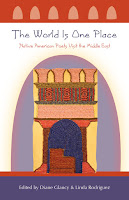
Linda Rodriguez’s
Plotting the
Character-Driven Novel, based on her popular workshop, and
The
World Is One Place: Native American Poets Visit the Middle East,
an anthology she co-edited, are her newest books.
Every Family
Doubt, her fourth mystery novel featuring Cherokee campus police
chief, Skeet Bannion, will appear in autumn, 2017. Her three earlier
Skeet novels—
Every Hidden Fear,
Every Broken Trust,
and
Every Last Secret—and
her books of poetry—
Skin Hunger
and
Heart’s Migration—have
received critical recognition and awards, such as St. Martin’s
Press/
Malice Domestic Best First Novel, International
Latino Book Award, Latina Book Club Best Book of 2014, Midwest Voices
& Visions, Elvira Cordero Cisneros Award, Thorpe Menn Award, and
Ragdale and Macondo fellowships. Her short story, “The Good
Neighbor,” published in the anthology,
Kansas City Noir, has
been optioned for film.
Rodriguez is past chair of the AWP
Indigenous Writer’s Caucus, past president of Border Crimes chapter
of Sisters in Crime, founding board member of Latino Writers
Collective and The Writers Place, and a member of International
Thriller Writers, Wordcraft Circle of Native American Writers and
Storytellers, and Kansas City Cherokee Community. Visit her at
http://lindarodriguezwrites.blogspot.com
